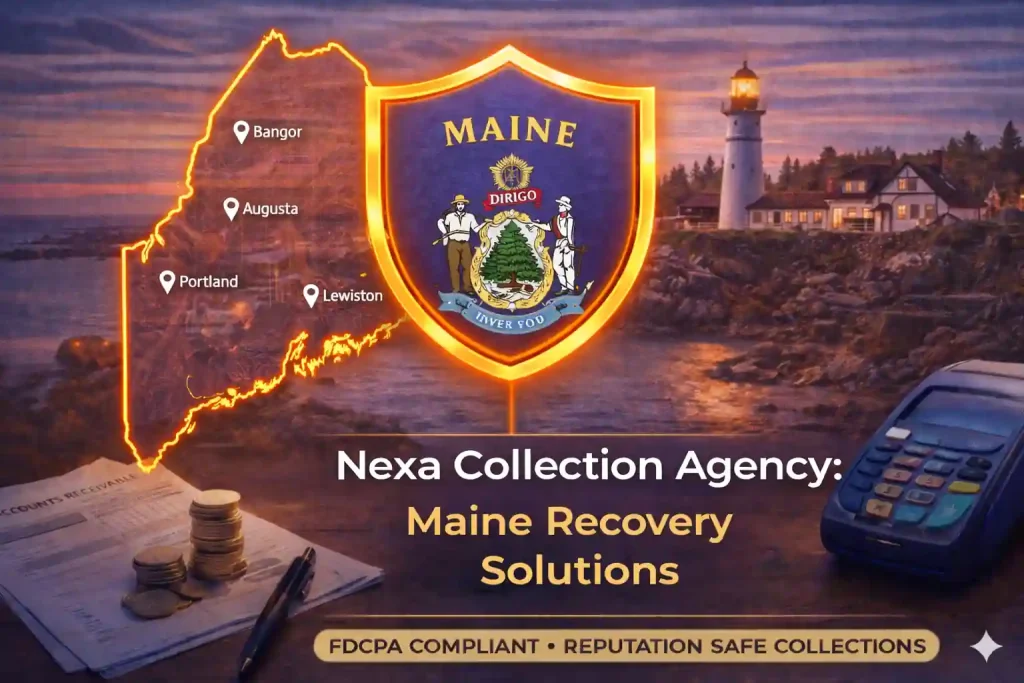
In Maine—from the industrial ports of Portland and the healthcare networks of Bangor to the legendary timber and seafood hubs of the North Woods—cash flow is the lifeline of your business. But in 2026, Maine is no longer a standard collection territory. With a total ban on medical debt credit reporting and a new $15.10 minimum wage floor impacting garnishments, standard “aggressive” tactics will trigger state investigations. You don’t just need a collector; you need a Maine-compliance expert who knows how to recover your revenue without crossing the Bureau of Consumer Credit Protection. Nexa is a Maine-compliance powerhouse.
Nexa provides 100% reputation-safe, equipped with all 50-state collections license, offering free credit reporting, free litigation/bankruptcy scrubs, and zero onboarding fees. Secure – SOC 2 Type II & HIPAA compliant.
Need a Collection Agency? Contact us
The Maine Legal Landscape (2026 Summary)
Maine’s laws are among the strictest in the nation. The state is actually exempt from several federal FDCPA rules because its own Maine Fair Debt Collection Practices Act is even more protective of consumers.
| Debt Type | Statute of Limitations | Maine Revised Statute (MRS) |
| General Debt/Oral | 6 Years | 14 MRS § 752 |
| Written Contracts | 6 – 20 Years | 14 MRS § 751 (Seal dependent) |
| Medical Debt | 6 Years | REPORTING BANNED (LD 558) |
| Wage Garnishment | ALLOWED (40x Wage Floor) | 9-A MRS § 5-105 |
Critical Maine Rules for 2026:
-
The Medical Reporting Ban (LD 558): As of September 2025, it is illegal for debt collectors or credit bureaus to include medical debt on Maine consumer reports. If your current agency relies on “hitting their credit,” they are effectively powerless. Nexa uses mediation and judicial remedies to get you paid.
-
2026 Wage Floor: Effective Jan 1, 2026, Maine’s minimum wage is $15.10/hour. This means the “protected” amount a debtor keeps from garnishment has risen to $604/week (40x minimum wage). We calculate this floor with precision to avoid rejected court orders.
-
The 6-Year Clock: You have a firm 6-year window to commence a collection action. Nexa’s Step 1 & 2 process ensures you act before your debt becomes “time-barred.”
Cost-Effectiveness: The Nexa Advantage
-
Fixed-Fee Recovery ($15/account): Best for early-stage accounts. Debtors pay 100% directly to you.
-
Contingency Service (20%–40%): Our “No Recovery, No Fee” model. If we don’t bring the money home, you don’t owe us a cent.
Industries We Serve in Maine
-
Healthcare & Medical: 100% HIPAA-compliant recovery for hospitals and specialty clinics. We are the state leaders in navigating LD 558, using empathetic mediation to preserve patient-doctor trust.
-
Forestry & Manufacturing: B2B recovery for paper mills, timber suppliers, and industrial manufacturers. We handle high-value equipment and raw material contract disputes.
-
Tourism & Hospitality: From Bar Harbor resorts to Portland’s culinary scene, we recover unpaid event balances and “no-show” fees while protecting your “Vacationland” brand.
-
Seafood & Maritime: Specialized recovery for lobster dealers, processors, and freight firms operating out of the Port of Portland. We understand the fast-paced cash cycles of the Maine coast.
-
Colleges & Universities: From the UMaine system to private liberal arts colleges, we manage tuition and housing recovery with a focus on student-first mediation.
-
Accountants & CPA Firms: Recovery of professional service fees. We ensure you get paid for your expertise without alienating the local business clients you’ve served for years.
-
Banks & Credit Unions: Expert handling of delinquent consumer loans and deficiency balances using Maine’s specific Rule 300 operational standards.
-
Restoration, Construction & Waste Management: We help Maine contractors navigate 10 MRS Chapter 551 (Mechanic’s Liens) to ensure they get paid for labor and materials.
Recent Maine Recovery Results
Case 1: Bangor-Area Multi-Specialty Clinic (Medical)
-
The Problem: $90,000 in aging debt. The clinic feared they could no longer collect due to the new credit reporting ban.
-
The Result: Nexa used a diplomatic “mediation-first” approach, recovering $61,000 in 75 days without needing a single credit bureau report.
Case 2: Portland Industrial Fabricator (B2B)
-
The Problem: A $48,000 unpaid invoice for custom metalwork.
-
The Result: We utilized Maine’s 6-year written contract statute to file a pre-suit notice, resulting in a full $48,000 recovery within 30 days.
Frequently Asked Questions (FAQ)
1. Can medical debt still be collected in Maine if it’s not on credit reports?
Yes. The ban only stops reporting the debt. You still have every legal right to sue for a judgment and garnish wages. Nexa’s legal network specializes in these judicial recoveries.
2. What is the minimum amount for wage garnishment in 2026?
As of Jan 1, 2026, a debtor’s first $604 of weekly disposable income is protected under Maine’s $15.10 minimum wage floor. We focus our efforts on accounts where income exceeds this threshold to ensure a high ROI for you.
3. Does Nexa handle Maine’s Electronic Surety Bond (ESB) requirements?
Yes. Nexa is fully compliant with the Bureau of Consumer Credit Protection’s 2026 ESB mandates, ensuring our license is always active and your collections are never interrupted.
Popular Cities:
